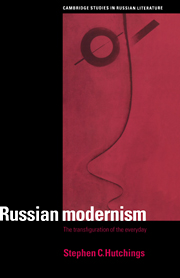Book contents
- Frontmatter
- Contents
- Acknowledgments
- Note on transliteration, citation and translation
- Introduction
- PART ONE
- PART TWO
- PART THREE
- 5 The struggle with byt in Belyi's Kotik Letaev and The Christened Chinaman
- 6 Breaking the circle of the self: Vasilii Rozanov's discourse of pure intimacy
- 7 At the “I” of the storm: the iconic self in Remizov's Whirlwind Russia
- Conclusion
- Notes
- Bibliography
- Index
- CAMBRIDGE STUDIES IN RUSSIAN LITERATURE
6 - Breaking the circle of the self: Vasilii Rozanov's discourse of pure intimacy
Published online by Cambridge University Press: 28 October 2009
- Frontmatter
- Contents
- Acknowledgments
- Note on transliteration, citation and translation
- Introduction
- PART ONE
- PART TWO
- PART THREE
- 5 The struggle with byt in Belyi's Kotik Letaev and The Christened Chinaman
- 6 Breaking the circle of the self: Vasilii Rozanov's discourse of pure intimacy
- 7 At the “I” of the storm: the iconic self in Remizov's Whirlwind Russia
- Conclusion
- Notes
- Bibliography
- Index
- CAMBRIDGE STUDIES IN RUSSIAN LITERATURE
Summary
Hellenism is the warmth of the hearth experienced as sacred … [it] is a system in the Bergsonian sense of the word, one which a person unfolds around him, like a fan of phenomena liberated from temporal dependence.
(Osip Mandelshtam)Belyi understood that homes possess a time and a space all of their own. The capacity of their confined spaces to accommodate self/other relations founded on intimacy, and of their correspondingly homely temporality to liberate anonymously scheduled lives from society's plotted boundaries allows us to speak generally of a domestic chronotope which all three writers treated in part in adopt particular versions. In Vasilii Rozanov's case, the retreat inside the walls of home is associated with an assault on literature's inflated pretensions to universality in favor of the “honest spontaneity” of a fragmentary form of autobiographic writing situated on the margins of the aesthetic. An attempt to shed light upon the ensuing fog of conflicting opinions as to how precisely to categorize Rozanov's work will underlie my analysis in this chapter.
I proceed first by demonstrating how Rozanov's positing of a self-oriented domestic time-space to counter the other-oriented time-space of literature generates a paradigm cutting across the disorderly variety of Rozanovian discourse-types and consisting of paired oppositions: home to outside world, self to other, life to literature, concrete to abstract. In a gesture grounded in the anti-aesthetic from which he emerged, Rozanov manipulates the value system implicit in the paradigm to accomplish a series of reversals, revalorizing the trivia of daily life at home as the truly literary, the transient as the lasting, and so on.
- Type
- Chapter
- Information
- Russian ModernismThe Transfiguration of the Everyday, pp. 168 - 193Publisher: Cambridge University PressPrint publication year: 1997



